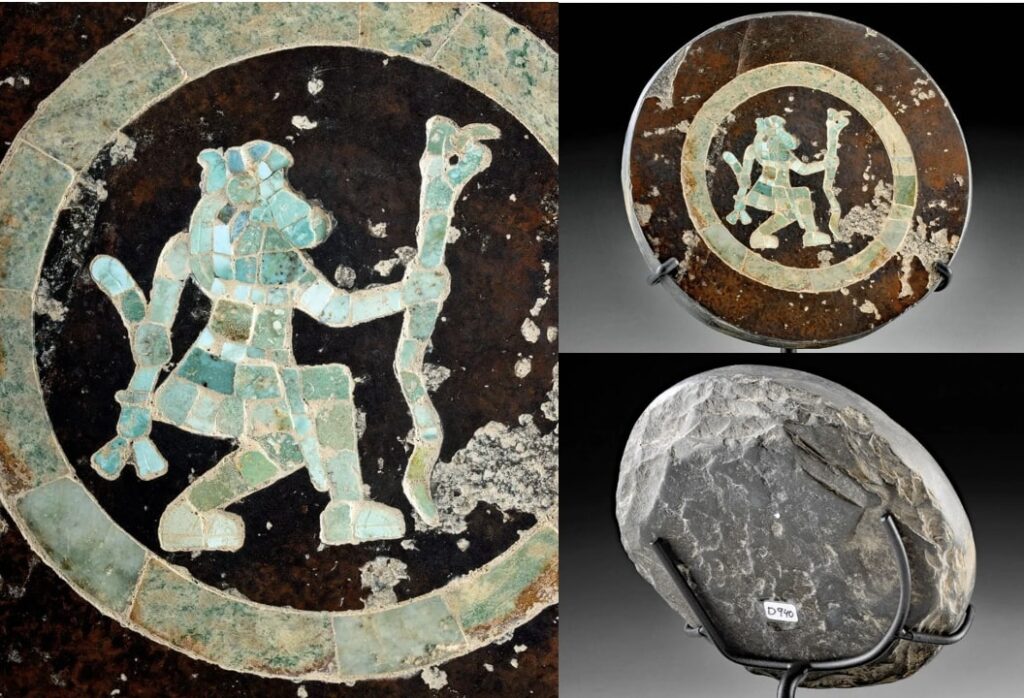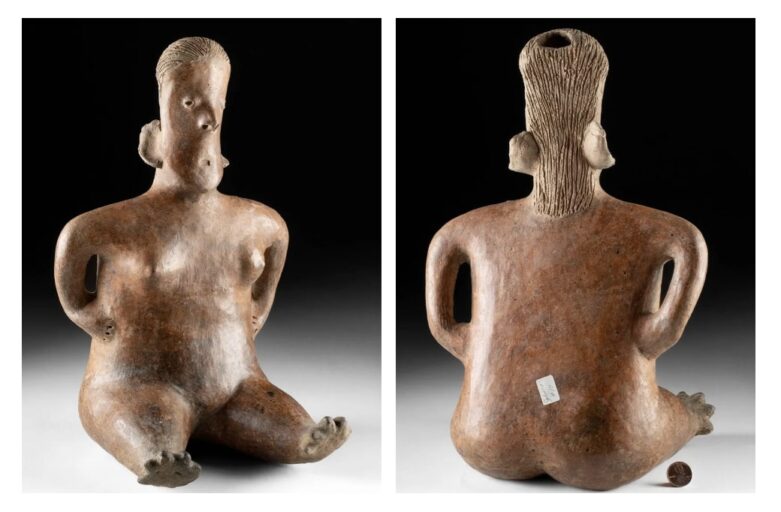
TEOTIHUACAN CULTURE | Mirrors with green stone inlays dating from the period between 3 and 7 C.E. (Photo/X)
ARTEMIS GALLERY HOLDS AUCTION OF 20 ARCHAEOLOGICAL GOODS FOR MARCH 28.
By El Comercio de Colorado Editorial Staff
Haga click aquí para leer la versión en español
The Secretariat of Culture and the National Institute of Anthropology and History (INAH) of Mexico have expressed their strong rejection of the auction of 20 Mexican archaeological goods scheduled by the Artemis Gallery, based in Louisville, Colorado, for March 28, 2024. This action has sparked an immediate response from the Mexican government, which seeks to protect the country’s cultural heritage.
Mexican authorities have initiated legal and diplomatic processes both nationally and internationally to ensure that these pieces are repatriated to Mexico. According to INAH reports, confirmed by the Mexican Consulate in Denver, they are “advancing official actions to guarantee the restitution of the objects that have been identified as Mexican archaeological monuments, protected by national legislation.”
Among the pieces in question are objects of great historical and cultural value, ranging from zoomorphic figurines to fragments of sculptures, belonging to various Mesoamerican cultures such as the Maya and the Teotihuacan. “These elements are not only an integral part of Mexico’s cultural heritage but also represent a vital connection to the country’s ancestral roots and its indigenous peoples,” details INAH.

ALERT| Message from Beatriz Gutierrez Muller about the auction in Colorado. (Photo/X)
The Request
The Mexican government has called on the Artemis Gallery to halt the auction of these pieces, reminding them of their ethical and legal responsibility in the trade of cultural goods. However, so far, the gallery has stated that it has not received any official notification related to the pieces in question from the Mexican authorities.
In a conversation with El Comercio de Colorado, Lissa Pipper, business manager of Artemis Gallery, pointed out that they are willing to follow all protocols and practices established in the 1970 UNESCO Convention, which regulates the market for ancient art in the United States. The 1970 UNESCO Convention, of which the United States is a signatory, establishes international standards to prevent the illicit traffic of cultural goods.
The Artemis Gallery has indicated that the Department of Homeland Security (DHS) must notify them, in writing, about the value of those pieces in order to exclude them from the auction. “The government of Mexico must communicate the heritage value of the pieces to their counterpart,” Pipper said. As of the closing of this note, the twenty pieces with heritage value according to INAH could be auctioned on Thursday, March 28.

FEMALE NUDE TORSO | Nayarit Pottery from 300-350 C.E. (Photo/X)
Is Repatriation Possible?
The fact that the archaeological pieces could be acquired in the March 28 auction does not prevent their possible repatriation. The 1970 UNESCO Convention regulates how this process is carried out. The new owners would be contacted by the DHS and would have the right to compensation if legally viable. However, the action of the DHS, on behalf of the American government, is related to the request and justification presented by the government of Mexico regarding the heritage value of the pieces.
Follow the auction
https://www.liveauctioneers.com/catalog/323332_fine-antiquities-ethnographic-fine-art/
Mexican Government Condemns Auction of Mexican Archaeological Goods
You may also like:
The Denver Broncos sponsored the U-16 Flag Touch Football tournament in Mexico
Seeking Protection for Mobile Homeowners in Colorado
New Generation of Leaders Takes on Challenges






otras noticias
Antisemitism Strikes Colorado’s Jewish Community
Informal hot dog sales raise concerns in Denver
16th Street fills with free events and community activities